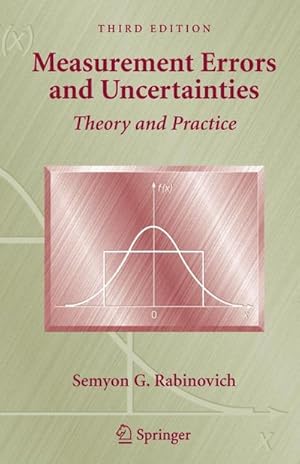measurement errors uncertainties theory von rabinovich semyon (8 Ergebnisse)
FeedbackSuchfilter
Produktart
- Alle Product Types
- Bücher (8)
- Magazine & Zeitschriften (Keine weiteren Ergebnisse entsprechen dieser Verfeinerung)
- Comics (Keine weiteren Ergebnisse entsprechen dieser Verfeinerung)
- Noten (Keine weiteren Ergebnisse entsprechen dieser Verfeinerung)
- Kunst, Grafik & Poster (Keine weiteren Ergebnisse entsprechen dieser Verfeinerung)
- Fotografien (Keine weiteren Ergebnisse entsprechen dieser Verfeinerung)
- Karten (Keine weiteren Ergebnisse entsprechen dieser Verfeinerung)
- Manuskripte & Papierantiquitäten (Keine weiteren Ergebnisse entsprechen dieser Verfeinerung)
Zustand
Einband
Weitere Eigenschaften
- Erstausgabe (Keine weiteren Ergebnisse entsprechen dieser Verfeinerung)
- Signiert (Keine weiteren Ergebnisse entsprechen dieser Verfeinerung)
- Schutzumschlag (Keine weiteren Ergebnisse entsprechen dieser Verfeinerung)
- Angebotsfoto (3)
Sprache (2)
Preis
- Beliebiger Preis
- Weniger als EUR 20 (Keine weiteren Ergebnisse entsprechen dieser Verfeinerung)
- EUR 20 bis EUR 45
- Mehr als EUR 45
Gratisversand
Land des Verkäufers
Verkäuferbewertung
-
Zustand: Sehr gut. Zustand: Sehr gut | Seiten: 308 | Sprache: Englisch | Produktart: Bücher.
-
Measurement Errors and Uncertainties: Theory and Practice
Verlag: American Institute of Physics, 1999
ISBN 10: 0387988351 ISBN 13: 9780387988351
Sprache: Englisch
Anbieter: ThriftBooks-Atlanta, AUSTELL, GA, USA
EUR 25,23
Währung umrechnenEUR 6,59 für den Versand von USA nach DeutschlandAnzahl: 1 verfügbar
In den WarenkorbPaperback. Zustand: Very Good. No Jacket. Former library book; May have limited writing in cover pages. Pages are unmarked. ~ ThriftBooks: Read More, Spend Less 1.
-
Measurement Errors and Uncertainties: Theory and Practice
Anbieter: suspiratio - online bücherstube, Basel, Schweiz
EUR 75,00
Währung umrechnenEUR 3,90 für den Versand von Schweiz nach DeutschlandAnzahl: 1 verfügbar
In den WarenkorbHardcover. Zustand: Gut bis sehr gut. 3. Auflage. 320 pp. NEAR FINE - NUR A-886.
-
Measurement Errors and Uncertainties: Theory and Practice
Anbieter: Books From California, Simi Valley, CA, USA
EUR 72,96
Währung umrechnenEUR 12,72 für den Versand von USA nach DeutschlandAnzahl: 1 verfügbar
In den Warenkorbhardcover. Zustand: Good. Some damages to the cover from shelfwear and handlining.
-
Measurement Errors and Uncertainties : Theory and Practice
Anbieter: AHA-BUCH GmbH, Einbeck, Deutschland
EUR 111,53
Währung umrechnenKostenlos für den Versand innerhalb von/der DeutschlandAnzahl: 2 verfügbar
In den WarenkorbTaschenbuch. Zustand: Neu. Druck auf Anfrage Neuware - Printed after ordering - The major objective of this book is to give methods for estimating errors and uncertainties of real measurements: measurements that are performed in industry, commerce, and experimental research. This book is needed because the existing theory of measurement errors was historically developed as an abstract mathematical discipline. As a result, this theory allows estimation of uncertainties of some ideal measurements only and is not applicable to most practical cases. In particular, it is not applicable to single measurements. This situation did not bother mathematicians, whereas engineers, not being bold enough to assert that the mathematical theory of errors cannot satisfy their needs, solved their particular problems in one or another ad hoc manner. Actually, any measurement of a physical quantity is not abstract, but it involves an entirely concrete procedure that is always implemented with concrete te- nical devices-measuring instruments-under concrete conditions. Therefore, to obtain realistic estimates of measurement uncertainties, mathematical methods must be supplemented with methods that make it possible to take into account data on properties of measuring instruments, the conditions under which measu- ments are performed, the measurement procedure, and other features of measu- ments. The importance of the methods of estimating measurement inaccuracies for practice can scarcely be exaggerated. Indeed, in another stage of planning a m- surement or using a measurement result, one must know its error limits or unc- tainty. Inaccuracy of a measurement determines its quality and is related to its cost.
-
Measurement Errors and Uncertainties: Theory and Practice
Anbieter: Ria Christie Collections, Uxbridge, Vereinigtes Königreich
EUR 119,31
Währung umrechnenEUR 5,91 für den Versand von Vereinigtes Königreich nach DeutschlandAnzahl: Mehr als 20 verfügbar
In den WarenkorbZustand: New. In.
-
Measurement Errors and Uncertainties: Theory and Practice
Anbieter: Ria Christie Collections, Uxbridge, Vereinigtes Königreich
EUR 157,44
Währung umrechnenEUR 5,91 für den Versand von Vereinigtes Königreich nach DeutschlandAnzahl: Mehr als 20 verfügbar
In den WarenkorbZustand: New. In.
-
Measurement Errors and Uncertainties : Theory and Practice
Verlag: Springer New York Aug 2005, 2005
ISBN 10: 0387253580 ISBN 13: 9780387253589
Sprache: Englisch
Anbieter: AHA-BUCH GmbH, Einbeck, Deutschland
EUR 162,93
Währung umrechnenKostenlos für den Versand innerhalb von/der DeutschlandAnzahl: 2 verfügbar
In den WarenkorbBuch. Zustand: Neu. Neuware - The major objective of this book is to give methods for estimating errors and uncertainties of real measurements: measurements that are performed in industry, commerce, and experimental research. This book is needed because the existing theory of measurement errors was historically developed as an abstract mathematical discipline. As a result, this theory allows estimation of uncertainties of some ideal measurements only and is not applicable to most practical cases. In particular, it is not applicable to single measurements. This situation did not bother mathematicians, whereas engineers, not being bold enough to assert that the mathematical theory of errors cannot satisfy their needs, solved their particular problems in one or another ad hoc manner. Actually, any measurement of a physical quantity is not abstract, but it involves an entirely concrete procedure that is always implemented with concrete te- nical devices-measuring instruments-under concrete conditions. Therefore, to obtain realistic estimates of measurement uncertainties, mathematical methods must be supplemented with methods that make it possible to take into account data on properties of measuring instruments, the conditions under which measu- ments are performed, the measurement procedure, and other features of measu- ments. The importance of the methods of estimating measurement inaccuracies for practice can scarcely be exaggerated. Indeed, in another stage of planning a m- surement or using a measurement result, one must know its error limits or unc- tainty. Inaccuracy of a measurement determines its quality and is related to its cost.







